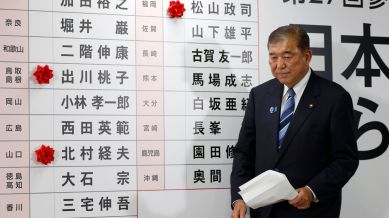Stay updated with the latest - Click here to follow us on Instagram
Japanese Prime Minister Shigeru Ishiba says he will stay in office to tackle high US tariffs despite election loss
The performance in the election will not bring about an immediate change of government, as the upper house does not have the power to file a no-confidence motion against a leader, but will raise questions about Ishiba's fate and raise uncertainty around Japan’s political stability.

Japanese Prime Minister Shigeru Ishiba’s ruling coalition, on Monday (July 21), faced a big blow in the crucial parliamentary election, as it failed to secure a majority in the 248-seat upper house, according to NHK public television.
To retain a majority, Ishiba’s Liberal Democratic Party (LDP) and its junior coalition partner Komeito needed to win 50 seats, in addition to the 75 seats that they already hold.
monthly limit of free stories.
with an Express account.
With just one more seat to be decided, the coalition secured 47 seats.
The loss is a major setback for Ishiba’s coalition, as it has now become a minority in both houses after its defeat in the lower house election in October.
The result worsens Japan’s political instability and marks the first time the LDP has lost a majority in both houses of parliament since the party’s foundation in 1955.
Despite the crushing blow, Ishiba expressed determination to fight challenges, including US tariff threats, without creating a political vacuum.
“While I painfully feel my serious responsibility over the election results, I believe I must also fulfill my responsibility I bear for the country and the people so as not to cause politics to stall or go adrift,” Ishiba said. “Challenges such as global situation and natural disaster won’t wait for a better political situation.”
However, there could be calls from within his party to either step down or find another coalition partner.
Ishiba coalition faces setback
Ishiba had aimed for a simple majority of 125 seats in the upper house, meaning his Liberal Democratic Party (LDP) and its Buddhist-backed junior coalition partner Komeito needed to win 50 seats.
Exit poll results released shortly after the ballots closed on Sunday night mostly showed a major setback for Ishiba’s coalition.
The LDP alone won 39 seats, better than most exit poll projections of 32, and remained the No. 1 party in the parliament, known as the Diet.
Ishiba attributed the coalition’s poor showing to the fact that his government’s measures to combat price increases had not yet reached many people.
“It’s a tough situation. I take it humbly and sincerely,” Ishiba told a live interview with NHK.
The performance in the election will not bring about an immediate change of government, as the upper house does not have the power to file a no-confidence motion against a leader, but it will raise questions about Ishiba’s fate and raise uncertainty around Japan’s political stability.
(With inputs from AP)